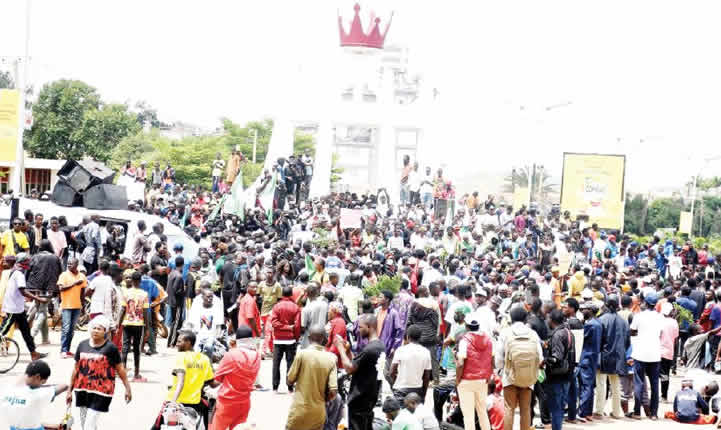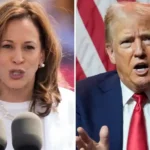
As the #EndBadGovernance nationwide protest fizzles out, many Nigerians, especially in the north, will live with the wounds, scars and financial losses for a long time to come.
The protests against economic hardship, which started August 1, continued even after President Bola Tinubu called for an end to the demonstrations that faced a crackdown from security forces, who reportedly shot at the protesters in various states in the northern part.
The cost-of-living crisis was fueled by surging inflation, at a 28-year high, and government economic policies that pushed the naira to record lows against the dollar.
At least 17 persons were reportedly killed in Abuja, Kano, Niger, Borno, Kaduna and Jigawa, with several others injured on the opening day of the protest against the nation’s worst cost-of-living crisis in a generation and against the corruption and alleged bad governance that have stifled its development.
The confirmation of the use of ammunition by the military immediately contradicted the Inspector-General of Police, Kayode Egbetokun’s claim that none of the nation’s security agencies applied excessive force, including the use of live bullets on the protesters.
Amnesty International condemned the use of deadly action against the protesters, accusing the security operative of killing at least 21 protesters during a week of rallies against economic hardship.
The global body stated, “Our findings, so far, show that security personnel at the locations where lives were lost deliberately used tactics designed to kill while dealing with gatherings of people protesting hunger and deep poverty.”
In a statement, Nobel Laureate Professor Wole Soyinka also slammed the government for the use of live bullets against unarmed protesters.
“Live bullets as state response to civic protest – that becomes the core issue. Even tear gas remains questionable in most circumstances, certainly an abuse in situations of clearly peaceful protest. Hunger marches constitute a universal S.O.S, not peculiar to the Nigerian nation,” Soyinka wrote.
Aside the dead, the protest recorded other casualties who barely survived to recount their near-death experiences as the nationwide demonstrations fizzled out.
A cameraman with the African Independent Television cameraman, Femi Kuku, narrowly escaped being shot by security operatives, who reportedly opened fire on journalists covering the protest at the Moshood Abiola National Stadium, Abuja last Saturday.
Kuku noted that the security operatives knew that they were all journalists yet opened fire on them.
While Kuku ran for his dear life, he fell into an uncovered manhole and suffered a dislocation on his left leg.
“It was my colleagues who picked me up and pushed me inside the Toyota Sienna vehicle we came with because I could not walk at that point,” he said. “When we moved forward a bit, we stopped to check if everybody was okay, and that was when we saw them coming towards us again with their vehicles. They came down and started shooting again, so we sped off into town.
“From that point, we went to the office, and I was taken to the hospital to check my leg. I had no bruises but the left leg and ankle are swollen, it’s very painful, so I leap walk now.”
Gombe victims
On Saturday, officials at the Federal Teaching Hospital Gombe said no fewer than eight persons were brought in for medical attention following the demonstrations, with six still receiving treatment.
“Five of the patients are in Accident and Emergency (ward) with multiple fractures, lacerations and another is in Intensive Care Unit,” an official of the hospital told The Nigerian .
It was learnt that the patient in ICU had two bullet wounds and was on life support.
One of the patients, Mohammed Abdulrawuf, 18, who had his right leg heavily bandaged, sobbed as he recounted how he was shot at by security personnel in Gombe.
The teenager, who denied being among the protesters, said he was hit by a bullet as security personnel chased irate youths who looted shops in Gombe.
He added that his dream of becoming a military officer might be dashed if he didn’t receive adequate medical attention.
He said, “I was at my uncle’s house when area boys (hoodlums) attacked people, burgled shops, and caused chaos. As I left for my house, police and soldiers started pursuing everyone, including me, despite not being part of the protest.
“In the midst of the chaos, I fell into a gutter. One of them shot me in the leg. He wants to end my lifetime ambition of serving in the Nigerian Army. I don’t have a father and I’m the only one fending for my family,” he added.
He begged the Federal Government to come to his aid, saying he is still hopeful of becoming an army officer in the future.
“I pray can walk properly after treatment, which will still make me eligible to join the army, so, I’m calling on the government to financially support the victims of the protest in our time of need,” he said.
The patient at the Accident and Emergency ward, Rabiu Ibrahim, a 27-year-old commercial motorcyclist, was visibly helpless following a fracture and several cuts he sustained.
“I need emergency assistance. As you can see I have a fracture on one hand and on the other is a tendon injury and multiple lacerations,” the native of Balanga Local Government Area, told The Nigerian .
He claimed he was not part of the protest.
“I had just returned from my grandfather’s house, and I was in front of my house around Central Primary School when men of the PMF 99 accosted me and beat me up, giving me multiple fractures, lacerations and a tendon injury.”
Also, Hassan Haruna, 18, a fish seller, recounted how he found himself at the Federal Teaching Hospital, Gombe.
“I went to the peaceful protest but police shot teargas around the roundabout. As I tried to escape I was cut by an abandoned glass that pierced my leg, which led to excessive bleeding, I lost a lot of blood and became very weak.”
No fewer than 205 church chairs, musical instruments and other equipment worth millions of naira were reportedly stolen by hoodlums, who invaded a Living Faith Church in Daura Local Government Area of the Katsina State, on the first day of the nationwide protest against hardship.
“They packed everything inside the church auditorium, including the digital wall clock, musical instruments, pastor’s chairs, plastic chairs and a desktop computer at the reception, as well as a scoreboard where the accountant usually kept church documents. They scattered everything,” the church pastor, David Jato, said.
“The protest began around 10am and the hoodlums, many of them in Keke Napep (tricycle), just diverted to the church, destroyed the door and glasses and penetrated the church auditorium.
“Three churches were their target and while they succeeded in invading the Living Faith Church and Deeper Life, they couldn’t gain access into the third, the Anglican Church.”
A viral video showed policemen wrestling with Hamza Waziri, a physically challenged person, on his wheelchair in front of the Bauchi State Government House.
Waziri, who relies on a wheelchair for mobility, was peacefully exercising his constitutional right to protest when he was attacked by the police officers.
Leader of the Initiative for the Liberalisation of Physically Challenged People Waziri said he was with other physically challenged persons exercising their constitutional rights of peaceful demonstration when they were attacked by the security personnel.
He told The Nigerian , “I decided to organise this protest to show my displeasure with the current economic situation of the country. In the process, I was doing a live video and one of the policemen came to me and said that I had filmed him and they were trying to grab the phone from me. And they were hustling me to grab the phone from my hand and that is how they kept brutalising me. They gave me a couple of punches as you could see from the video.
“So, basically I was very peaceful. We were not more than 10, just to raise our placards which read ‘Employment should be for all’ and ‘Inclusive Society.’”
Special Adviser on Media and Publicity to the Bauchi State Governor, Mukhtar Gidado, said Governor Bala Mohammed had ordered a “thorough investigation into the incident involving a person with a disability and security personnel at the Government House.”
Gidado stated, “Governor Bala Mohammed has made it clear that the welfare and rights of all citizens, especially vulnerable groups, remain his top priority. He directed a thorough investigation to ascertain the facts surrounding the incident and ensure that justice is served.”
The National Commission for Persons with Disabilities demanded justice following the assault.
“The actions of the police officers involved are a clear violation of the Discrimination Against Persons with Disabilities (prohibition) Act of 2018 and the fundamental human rights enshrined in our constitution,” executive secretary, NCPWD, James Lalu, said.
“This reprehensible act, captured in a video currently circulating on social media, shows Mr. Waziri being brutally battered while exercising his constitutional right to peaceful protest in front of the Bauchi State Government House.
“Hamza Waziri is not only a person with a disability but also a respected member of the CODE Board of Trustees, a Mandela Washington Fellow, a Chevening Fellow, and the founder of the Initiative for the Liberalisation of Physically Challenged People in Nigeria.”
Meanwhile, pan-Yoruba socio-political organisation, Afenifere, has called on the Federal Government to investigate the killings of some protesters in some parts of the country.
The body stated this in a communiqué issued at the end of its meeting held at the residence of its leader, Pa Ayo Adebanjo, at Ogbo Ijebu, Ogun State on Thursday.
The communiqué, which was signed by Adebanjo and the National Publicity Secretary of the organisation, Justice Faloye, read, “The Federal Government should investigate deliberate violation of rights, particularly the circumstances of the killing of those who died in the protests and bring to book those – including security agents – proven to be culpable in these regard.”
The group urged President Bola Tinubu “to see the nationwide protest, the diversity of its prosecution and outcome in different regions, as a clear verdict for the restructuring of the Nigerian federation in tandem with the well-considered foundational covenant of true federalism and in honest demonstration of statesmanship immediately set in motion irreversible machineries, in this regard as the panacea for the unity, peaceful coexistence and development of a nation where no man, woman or tribe is oppressed.”
Also on Thursday, Kaduna State Governor, Senator Uba Sani, pledged to ensure justice for Ismail Muhammad, the 16-year-old who was killed by a soldier during a protest in Samaru, Zaria.
Sani stated on X.com, “Today (Thursday), I dispatched a high-powered delegation made up of top government officials and heads of security agencies to condole with the family of the teenager, Ismail Muhammad, who was killed when troops of the Nigerian Army mobilised to disperse a mob in Samaru area of Sabon Gari LGA during the last protest.
The team was led by the Overseeing Commissioner for Internal Security, Samuel Aruwan. While the team was with the family, I spoke on the phone with the father of the deceased, Muhammad Hussaini, and expressed our deepest condolences.
“I told him that we are deeply pained by the unfortunate incident and will leave no stone unturned to ensure that justice is served. A full and thorough investigation will be conducted and the culprit will be brought to book.
“I will stay in close contact with the family of the deceased in these trying times.”
Barakat N5bn loss
In Kano, several public and private facilities, including the Nigerian Communications Commission, Kano State High Court and a number of vehicles parked within the court’s premises were vandalised and looted, as well as the Kano State Printing Press among several others.
Popular supermarket in the city, Barakat Stores, was among the worst hit with a reported loss of over N5bn to hoodlums during the anti-hunger protest in Kano.
The General Manager of the supermarket, Alhaji Muhammad Sani, made the disclosure in a telephone interview with The Nigerian on Wednesday.
He said the hoodlums, who stormed their warehouse located along State Road, near Government House, vandalised and looted the warehouse, including three containers of items that were imported from China and Turkey.
“Just a few days into the protest we imported two containers of items we deal in from China and a container of King’s Oil (vegetable oil) from Turkey and we have not even paid for them,” he said.
The General Manager, who lamented the colossal loss, called on the government for assistance.
“We have already lost our investment to the hoodlums, but any assistance from the government will be appreciated.”
Similarly, another victim and proprietor of She-She Supermarket located along Hadeja Road, Ammar Khalil, said he lost over N30m to the hoodlums.
According to him, items stolen from the pharmacy and supermarket include computers, machines for testing ailments, as well as drugs and other essential commodities.
“I have never witnessed such in Kano. These are youths who don’t have anything doing in the town. I think the government has to do something about youth unemployment in Kano otherwise in the next 10 years even the state governor will not escape from their attacks,” Khalil said.
He called on the Federal Government to help victims who suffered huge losses as a result of the protest in the state and other parts of the country.
One of our correspondents reported that the Gombe State Bureau of Public Service Reforms, Bima Lodge, Kumbiya-Kumbiya Primary Healthcare Centre, Gombe Main Market and Blue Jay Motor Park – a commercial motor company where six Sienna vehicles were destroyed – were all vandalised, among others in Gombe city.
Papa Ejinma, an Igbo trader, had his shop destroyed in Gombe and is still counting his financial losses.
“What I lost is over N10m, they swept all my goods. I’m pleading with the Gombe State Government and the Federal Government to intervene.”
Anambra State-born Ekene Ihechuoha, who deals in spare parts for vehicles, told our correspondent that he lost his goods on Friday to hoodlums following the protest.
“I’m at Michika House BCG, Gombe. Many thought I had passed because of the injuries I sustained. They inflicted cuts on my head, back and neck.
“They made away with the spare parts outside my shop, things like two wind shafts; bearing and they took my phone. I lost over N210, 000, my phone amount not inclusive.”
In Maiduguri, the Borno State capital, Boko Haram extremists killed four protesters but sources told The Nigerian people others suffered varying injuries after protesters clashed with the police, which led to sporadic shootings and alleged use of grenade by the security operatives.
One of the victims, Mohammed Dauda, was allegedly shot at in a mechanic workshop in Maiduguri.
Dauda’s sister, Fatima, said he was currently being treated at an undisclosed location.
She said, “My junior brother Mohammed was out for work on Thursday. Our elder brother, who works in the same place with him, said he witnessed the incident live. He told us that Mohammed wanted to cross the road, but police stopped him from crossing. He insisted and in the process of crossing the road, police shot at his leg.”
A crying Halima Ali, mother to one of the victims, Habila, added, “I was at home in Bulumkutu Kasuwa on the protest day when Habila said he was going out. I warned him to stay indoors because of the situation that very day. He insisted that he was only going to see his friend.
“When they (him and his friends) were outside, I didn’t know what happened, but his friends said there was chaos and police unleashed grenade and everybody ran for cover; it was in the process that the friends said police shot my son.”
Halima added that the Federal Government should treat the victims of the protest, as well as compensate them and their families.
“People came out to protest against hunger and poverty, so, where do you expect them to get the money to treat themselves? Government should set up emergency centres to treat those injured and also compensate families of the ones killed,” she said.
Despite the use of lethal force against protesters and the arrest of over a thousand of them, which many believed led to the gradual withdrawal of the demonstrators, Damilare Adenola, Director of Mobilisation, Take It Back Movement, one of the organisers of the protest, said they had not backed out of the protest, adding that the issue was the government clampdown on activists and protesters.
“The protest has not died down. We should be talking about how the government continually cracks down on free speech, making it unsafe for activists and citizens to express their human rights,” Adenola stated.



